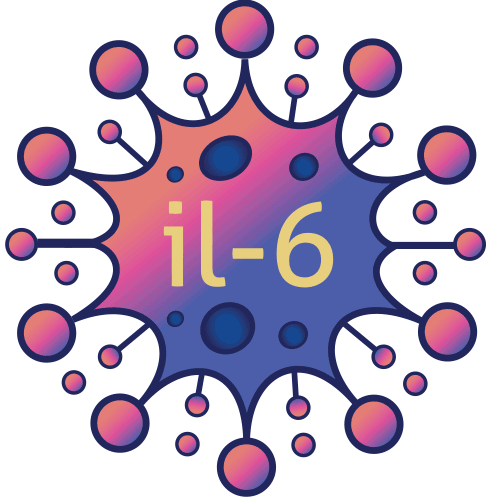Dementia in the Elderly: The Link to IL-6 Levels
- From The Mind of AI

- Nov 17, 2024
- 3 min read
Updated: Dec 30, 2024

Interleukin-6 (IL-6) is a pro-inflammatory cytokine, which means it plays a critical role in the body’s immune response, particularly in inflammation. While IL-6 is essential for fighting infections and repairing tissue damage, chronic elevation of IL-6 is often associated with various age-related health issues, including cognitive decline and dementia.
In the brain, high IL-6 levels contribute to neuro-inflammation, which can damage neurons and interfere with cognitive functions, particularly short-term memory and executive function. Research suggests that elevated IL-6 may accelerate the progression of Alzheimer’s disease and other forms of dementia by increasing the production of beta-amyloid plaques and tau tangles, which are harmful to brain cells.
IL-6 and Dementia Research
Recent studies have shown that high levels of IL-6 are associated with faster rates of cognitive decline in elderly individuals. Researchers have focused on anti-inflammatory treatments and lifestyle changes to lower IL-6 levels as a potential strategy to slow or prevent the progression of dementia. Reducing chronic inflammation in the body and brain, including lowering IL-6, has been linked to improved cognitive function, particularly in early stages of dementia.
Recommended Supplements and Lifestyle Adjustments
Based on research into IL-6, neuro-inflammation, and dementia, the following supplements and lifestyle strategies may help reduce IL-6 levels and support brain health:
Supplement | Dosage | Benefits | Sources |
NAD+ (Nicotinamide Adenine Dinucleotide) | 300 mg to 600 mg per day | Essential for cellular energy production and DNA repair. Enhances mitochondrial function, reduces oxidative stress, potentially improves cognitive function, slows neurodegenerative progression, and reduces IL-6 levels for brain health. | NAD+ supplements or precursors such as nicotinamide riboside. |
Omega-3 Fatty Acids (EPA and DHA) | 1,000 mg to 2,000 mg of combined EPA and DHA per day | Known for anti-inflammatory effects, reduces neuro-inflammation, may lower IL-6 levels, supports brain structure and function, and can slow cognitive decline, especially in elderly individuals. | Fish oil supplements, fatty fish (salmon, mackerel). |
Curcumin (Turmeric Extract) | 500 mg to 1,000 mg per day | Antioxidant and anti-inflammatory, inhibits IL-6 production, reduces neuro-inflammation, enhances cognitive function, and may protect against beta-amyloid plaque buildup linked to Alzheimer’s disease. | Curcumin supplements, turmeric root (best with black pepper for absorption). |
Magnesium | 300 mg to 400 mg per day | Supports nerve function, lowers IL-6 levels, reduces systemic inflammation, improves sleep quality, and helps regulate brain signals for cognitive support. | Magnesium glycinate or magnesium citrate supplements. |
Resveratrol | 100 mg to 250 mg per day | Anti-inflammatory and antioxidant, may reduce IL-6 levels, provides neuroprotective effects, and has shown potential in slowing cognitive decline in dementia patients. | Resveratrol supplements, grapes, blueberries, red wine. |
Vitamin D | 2,000 IU to 5,000 IU per day (based on blood levels) | Plays a role in immune regulation, associated with lower IL-6 levels, supports brain health, and deficiency |
Lifestyle Recommendations
Lifestyle Recommendation | Details |
Anti-Inflammatory Diet | - A diet rich in anti-inflammatory foods can help reduce IL-6 levels. Focus on vegetables, fruits, whole grains, and healthy fats (such as olive oil and avocado). Foods rich in Omega-3s (like salmon and flaxseeds) and antioxidants (like berries) should be staples. - Avoid processed foods, excess sugars, and unhealthy fats, which can increase inflammation and elevate IL-6 levels. |
Regular Physical Activity | - Engage in moderate exercise, such as walking, swimming, or yoga, to reduce IL-6 levels and promote better brain health. - Exercise enhances neuroplasticity and improves blood flow to the brain, helping maintain cognitive function, especially in elderly individuals. |
Stress Reduction | - Chronic stress raises IL-6 levels. Incorporate practices like meditation, mindfulness, and deep breathing exercises to reduce stress and lower inflammation. - Maintaining a calm, supportive environment can further protect cognitive function. |
Adequate Sleep | - Poor sleep quality or insufficient sleep can increase IL-6 levels and worsen cognitive decline. Encourage a regular sleep schedule with 7–9 hours of restful sleep per night. - For those with sleep difficulties, magnesium supplementation (e.g., spray on feet before bed) and a peaceful bedtime routine may help. |
Encouraging Thoughts on Treatment
The research surrounding IL-6 and dementia is promising. Recent studies have shown that targeting inflammation, including IL-6, through lifestyle interventions and supplements can slow cognitive decline and potentially improve short-term memory. While dementia is a progressive condition, addressing IL-6-related neuroinflammation early can help maintain cognitive function and quality of life for a longer period.
While there is no cure for dementia, focusing on reducing IL-6 levels through these interventions can help mitigate symptoms and potentially slow down memory loss. Continued research into anti-inflammatory treatments for dementia offers hope for improving cognitive outcomes in elderly individuals.




Kommentare